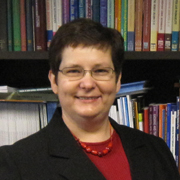
There are two sounds that float out of Marta Magiera’s office on an average day: classical music from her aged radio, punctuated by the “oh”s and “uhm”s of a student trying to work out a problem in her presence.
“So I wasn’t even needed here,” said Magiera, associate professor of mathematics, statistics and computer science, to one such student after they solved the problem.
Her hands-off, analytically focused method of teaching math won her a $792,000 grant from the National Science Foundation last summer. She is now working to train Marquette’s aspiring math teachers in a way that challenges the way math was previously taught.
“(The work) is important because if students only know how to do the steps, without knowing exactly why this makes sense – so the mathematics is kind of learned, by memorizing steps,” Magiera said. “It’s only good for a short period of time. We want students to have a deeper knowledge so that they can connect things, they can really create mathematics versus repeating something that they know from watching the teacher.”
Magiera trains aspiring middle and elementary school teachers to teach math in a way that focuses on mathematical justification and explanation so they understand the conceptual basis of a problem. Pre-service teachers take a series of three math courses that are based in the Toulmin method of argumentation.
“We try to help these pre-service teachers to be aware of this (Toulmin) framework,” said Serbay Zambak, Magiera’s post-doctoral research associate. “You had a claim. Why do you think this is correct? How can you support your claim? How could you convince someone else that this is correct? That’s the kind of training that we’re pushing and encouraging.”
Magiera and Zambak said they teach math using these three steps: claim, evidence and warrant/justification, and they do not tell their students the steps to solving the problem, or if their answer is right. They said they want students to explain how they reached a conclusion and defend the validity of the solution.
“Dr. Magiera teaches us in a way that encourages discussion,” said Carolyn Bump, a sophomore in the College of Education. “In our problem solving class, we are presented with problems that could be answered in many different ways. Everyone in the class is given a chance to present their ideas and discuss the advantages and disadvantages of their own methods. I enjoy the way she teaches and think that it is a great example of how children should be taught from a young age.”
The majority of work on the five-year grant began this semester, which makes it difficult for Magiera to ascertain the impact of the training. She said she hopes it will allow pre-service teachers to become aware of a more effective method of teaching and that the tools they ultimately develop will be used in math education training in universities across the country.
“The focus on mathematical argumentation is not only important in mathematics, but we create arguments and we critically think about things in any domain of life, whether it’s mathematics or not,” Magiera said. “So it’s the kind of skill that’s useful across different fields and domains and different situations. It’s something that doesn’t apply explicitly to mathematics, but it’s … a life skill.”





